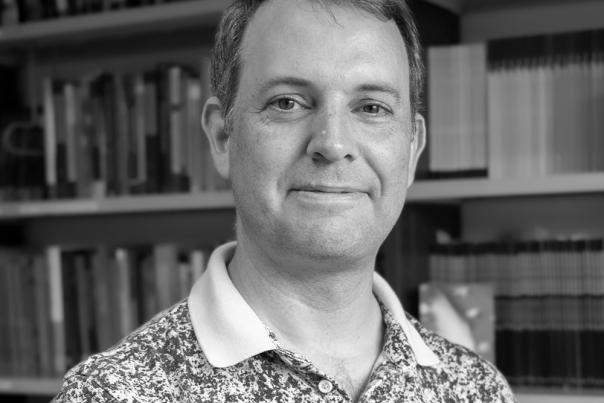Lieven Vandelanotte is professor of English language and linguistics at the University of Namur, and researcher in linguistics at KU Leuven, where he obtained his PhD in 2005.
Presentation
He has worked on topics related to the grammar and discourse of modern English from a broadly cognitive-functional perspective, with speech and thought representation, point of view and multimodality as his main current interests.

In addition to a monograph on the representation of speech and thought in English (De Gruyter Mouton, 2009), he has published over 40 journal articles and book chapters to date, co-edited five books on topics such as grammaticalization, textual choice in discourse and corpus linguistics, and co-edited special issues for Cognitive Linguistics, English Text Construction, Journal of Pragmatics and Language Sciences. He has also served as Area Editor for Linguistics (2010-2019) and Literature (2012-2019) for the John Benjamins journal English Text Construction. He teaches a series of courses on English language, linguistics and proficiency, as well as general linguistics, as part of Namur's undergraduate program. He is currently head of the Department of Germanic Languages and Literatures and a member of the NaLTT Institute's steering committee.
A recent open-access article on discourse constructions and the representation of thought is also available online.
Search
Francqui Research Professorship
Description - Grammar and use of speech and representation of thought and construction of viewpoints in text and image
Much of what people speak and write about concerns the words and thoughts of others or of themselves, whether real or imagined. This applies to a wide range of text genres and interaction contexts: novelists, newscasters, lawyers, students and academics, professionals of all stripes and ordinary interlocutors all report what has been said or thought in order to provide access to points of view, establish existing authority, challenge ideas, spice up a conversation, dramatize recounted events, and much else besides.
Linguists have long been fascinated by the forms that languages have developed to integrate speech and thought into discourse, and Lieven Vandelanotte has mainly specialized in this area, applied to today's English. In recent years, this interest has broadened to include a more general focus on issues of viewpoint construction in different types of discourse, including multimodal artifacts that combine text and images, such as Internet memes. The Francqui research chair focuses in particular on the linguistic analysis of Internet memes as point-of-view constructions, combining both linguistic and visual form with identifiable meanings. A research monograph co-authored with Barbara Dancygier (The Language of Memes) is currently in progress, expanding a line of work begun with the article "Internet memes as multimodal constructions" published in Cognitive Linguistics (28:3) in 2017. The Francqui Fellowship should also free up research time to prepare a book on the representation of speech and thought, updating and extending the approach taken in Speech and Thought Representation in English (2009).
Key words: cognitive linguistics, construction grammar, representation, fictive interaction, Internet memes, multimodality, social media discourse, speech and thought representation, point of view
An introductory and accessible article on Internet memes seen from a linguistic perspective, published in the popular magazine Babel, is available.
Mentor | Barbara Dancygier
Barbara Dancygier is Professor and Distinguished Research Fellow in the Department of English Language and Literature at the University of British Columbia in Vancouver, Canada. As a cognitive linguist, she has worked on topics such as conceptual point of view, conceptual metaphor theory, blending and construction grammar, across a range of discourse types, including multimodal artifacts. His work focuses in particular on the application of cognitive linguistic theories to literary discourse, including fictional narratives, poetry and drama.
Her awards and honors include a Fulbright Fellowship at the University of California, Berkeley (1991-1992), a Killam Research Prize at UBC (2011), a Distinguished Scholar-in-Residence position at the Peter Wall Institute for Advanced Studies at UBC (2012-2013), a Fellowship at the Institute of Advanced Study at Durham University (2015), and a Senior Research Fellowship at KU Leuven (2016). From 2017 to 2019, she was President of the International Cognitive Linguistics Association, of which she was a member of the Board of Directors from 2013 to 2023. Monographs she has published to date (with Cambridge University Press) include Conditionals and Prediction (1998), Mental Spaces in Grammar (co-authored with Eve Sweetser, 2005), The Language of Stories (2012) and Figurative Language (co-authored with Eve Sweetser, 2014). She has co-edited several journal volumes and special issues, and was sole responsible editor of the Cambridge Handbook of Cognitive Linguistics (2017).
Professor Dancygier is already familiar with Namur and its university, having been a plenary speaker at the 2008 annual conference of the Belgian Association of Higher Education Anglicists, and co-organized and spoken at the 2019 Reviewing viewpoint international workshop.
Affiliation
Bringing together linguists and literary scholars, UNamur's Institute of Languages, Texts and Transmediality provides a platform for interdisciplinary diachronic and synchronic research into the multiple ways in which different types of verbal and multimodal communicative practices manifest themselves in, shape, are regulated by and reflect culture and society.
